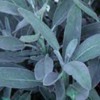I found an interesting article about Sage herb posted by the BBC news on the internet, and would like to share it with everyone on Givnology:
Centuries-old theories that the herb sage can improve memory appear to be borne out by modern research.
Scientists at the Universities of Newcastle and Northumbria tested 44 people, who were either given the herb or a dummy placebo pill.
They found that those given the sage oil tablets performed much better in a "word recall test".
Experts believe the active ingredient may boost levels of a chemical that helps transmit messages in the brain.
The Medicinal Plant Research Centre (MPRC) at the universities are testing many old-fashioned claims about the healing powers of herbs and flowers.
Sage is often referred to in ancient texts - in 1597 the herbalist John Gerard said that it was "singularly good for the head and quickeneth the nerves and memory."
This proves how valuable the work by the old herbalists was
Nicola Tildsley, MPRC
Researcher Nicola Tildsley said the results of the study proved that, in some cases at least, the herbalists should be taken seriously.
She said: "This proves how valuable the work by the old herbalists was, and that they shouldn't just be ignored because they were writing centuries ago."
There are still question marks over the herb's ability to boost long-term memory, she said.
"Tests would need to be carried out on people over a longer period of time to prove that sage improves exam performance - but we don't have any plans to do this at present."
Alzheimer's aid
However, it is possible that the herb could help patients affected by Alzheimer's disease, she said.
Alzheimer's is accompanied in many cases by a drop in the same brain chemical boosted by sage in experiments.
It also has antioxidant and anti-inflammatory properties, which may also conceivably help - although this is still far from proven.
The centre has already embarked on a study to test the effect of the herb on Alzheimer's patients, and results from this are expected soon.
The memory study was published in the journal Pharmacology, Biochemistry and Behavior.
Attachments
Original Post



